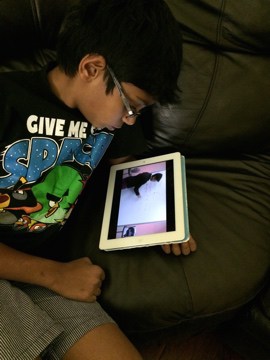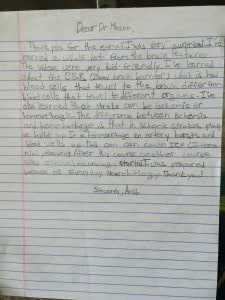Neurobiology MOOC Professor Exchanges Correspondence with Young Student
Prof. Peggy Mason Shares Heartwarming Experience as a MOOC Instructor.
The following post is from the blog, The brain is sooooo cool!, by Dr. Peggy Mason, professor at the University of Chicago, and instructor of the MOOC Understanding the Brain: The Neurobiology of Everyday Life, offered via Coursera. Prof. Mason blogs about various brain topics, such as the color of “the dress”, the under-recognized danger of head trauma in organized sports, to her work on empathy in rats, the focus of her lab at the University of Chicago.
Last week, Prof. Mason wrote a post on how teaching a MOOC has impacted her life, ironically by showing how it impacted a young learner, an aspiring neuroscientist. Its a heartwarming story, and seems to be just one of many that Prof. Mason could have shared about what it is like to be a MOOC instructor. Hopefully Prof. Mason will share more in the future–the ironic thing is, she could tell us quite a lot about what happens in the brain when we hear heartwarming stories, but the explanations are not as good as the experience. The story below is re-posted from her blog, with permission.
————————–
NeuroMOOCers, you overwhelm me!!
I have tried and tried, over and over, to write a post relating how teaching Understanding the Brain: The Neurobiology of Everyday Life on Coursera has changed my life. Every time that I have thought of sitting down to summarize my experience in writing, I quickly become overwhelmed by my feelings of deep gratitude for this journey that NeuroMOOCers and I have taken together over the last year plus.Which stories do I choose to tell? How can I leave that story out? Or that one? Or the one about….. and so on until once again, I write nothing. Then I received a message that made everything simple and easy. Let me set the stage. I received a message on LinkedIn from Mekhala Vithala:
Hello Dr. Mason,
My son Anish Garikipati wants to become neurosurgeon and enjoys learning from coursera on neurology. Needless to say the first one he loved was your course. Tomorrow is his Birthday. He would be elated if he gets a Birthday wish from you!! If it’s not too much to ask, may I request you to send a Happy B’day note to him? Here, you can see him on a candid video. Thank You!
The video that Anish’s mother attached showed a happy, playful young boy, with a spark in his eye, choosing to watch a video on the brain’s blood supply in his free time. This simultaneously playful, ambitious and studious young boy made me smile. So I fired off birthday wishes:
Happy Birthday Anish!
Study and think deeply and use your brain for good. And also get outside and play with others and with your imagination.
Best wishes,Peggy Mason
The next day, I heard again from Anish’s mother who sent me this video, along with this note from the now 11-year old Anish:
Dear Dr. Mason,
Thank you for the e-mail. I was very surprised. I’ve learned a whole lot from the brain lectures. The videos were very kid-friendly. I’ve learned about the BBB (Blood brain barrier) which is how blood cells that travel to the brain differ from blood cells that travel to different organs. I’ve also learned that stroke can be ischemic or hemmorhagic. The difference between ischemic and hemmhorahagic is that in ischemic strokes plaque build up. In a hemmorrhage an artery bursts and blood wells up. This can can cause ICP (Intercranial pressure). After this course anothercourse called clinical neurology started. I was prepared because of Everyday Neurobiology. Thank you!
Sincerely, Anish
I don’t think that I could possibly add to the beauty of Anish’s eloquence and Mekhala’s love for Anish. I am moved by a mother’s thoughtful love for her son and for her knowledge of what would make him happy; and by Anish’s beautiful expression of emotion and his amazing letter.
This entire interaction exemplifies what NeuroMOOC has meant to me. It is not that most of my students are young aspiring neurosurgeons. It is in fact nothing about the specifics of Anish or Mekhala although I am excited to see the future that Anish will help create. Instead, the core gift that I have received is the opportunity to reach thousands with Understanding the Brain: the Neurobiology of Everyday Life, leading to so many more fans for my beloved neurobiology. Meeting all of you, connecting with you, intellectually, emotionally and socially has enriched my life immeasurably. And I have emerged as a more fulfilled person. Thank you all.







